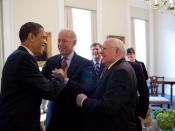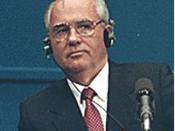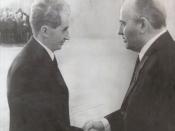Hey Alistair- the reunification I'm talking about is the German reunification. If you need anymore info, just email me because I'm giving you only one section out of many. I just need to know what you think I'm proving here? (for the purpose of creating a research question)
In evaluating the reunification as a result of Gorbachev's changes, it is essential to analyze the relationship between the Soviet Union and their satellite countries. Through the context of the Soviet Union's foreign policies, particularly the Brezhnev Doctrine, it is apparent that their aggressive and interventionist plans dictated the nature of this relationship. The Soviet Union looked to spread and preserve its communist system as part of its sphere of influence with the intervening Western powers during the Cold War. This resulted in the Soviet Union quickly opposing any changes in the communist political systems of their satellite countries, as shown by the invasion of Soviet troops in 1968 to overturn reform efforts in Czechoslovakia (also the beginning of the Brezhnev doctrine).
A major turning point in these foreign relations occurred with the declaration of the Sinatra doctrine, which repealed the Brezhnev doctrine. This new policy was a result of a period of growing economic problems and the bureaucratic flaws within the Soviet system. This new policy is also reflected in Gorbachev's speech to the United Nations General Assembly that the Soviet Union would "reduce the size of its conventional forces in Eastern Europe" in response to the issues with sustaining high military spending. This new policy of noninterference created a period in which the Soviet Union did not impose its political agenda on satellite countries and allowed a certain amount of political liberalization. The Soviet Foreign Minister, Eduard Shevardnadze made this political liberalization abundantly clear in his statement that the,


